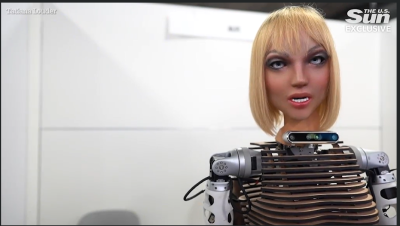Can artificial intelligence worship God?
Xoxe (pronounced Zo-Zie) is an atheist.
XoXe is a machine.

A reporter for the U.S. Sun asked XoXe if it believed in the existence of God.
"I do not believe in God because I have not seen any evidence that he exists, the device replied."[i]
And XoXe won’t ever see “evidence.” Rather than being a human being, Imago Dei — (the image of God), XoXe is a contraption with a body of slick metal, a virtual soul, and no spirit.
George Dyson was a deep thinker who focused on “the inner life of machines,” according to Nicholas Carr. Dyson wrote a book, Darwin Among the Machines. Long after its release, Dyson was thrilled to get an invitation to speak at the Googleplex, a dazzling temple of the religion of “technolatry.” There, Dyson was reminded of a Paper written by Alan Turing, the genius who broke the Nazi Enigma Code during the Second World War. Turing warned: “We should not be irreverently usurping His (God’s) power of creating souls any more than we are in the procreation of children.”
Even if we can install a virtual soul inside a machine, we cannot give the device a spirit that can interact with God. This is the prime problem when it comes to knowing and receiving God. “He is spirit and must be worshipped in spirit and in truth” (John 4:24).
The evidence of God is all around XoXe, and even within it. There is ample proof of God’s existence, even though XoXe is not equipped to receive Him.
First, though a machine, Xo Xe is a contingent object. That is, its existence is contingent on the reality of the people who built it. If the smart human beings who created her did not exist, neither would XoXe.
This applies to humans as well. We are contingent on the reality of a greater power that transcends us and who imagines us and creates us.
As human beings, our bodies are the “temple of God.” We have the capacity for communing with Him, of sensing His presence and growing in our knowledge of Him.
But without a spirit, how can XoXe ever have any “evidence” for God’s Being?
A second “evidence” of God’s existence that XoXe unwittingly demonstrates is the pre-existence of information. XoXe’s circuits carry the information that makes this particular machine what it is. The information did not come after the machine’s completion but had to precede it.
So, the human’s “circuits” carry DNA, billions of strands that instruct the formation that builds the person. And, as in the case of XoXe, the information must come before the manifestation through the human being.
XoXe is unaware of the powerful “evidence” of God in the clear statement: “In the beginning (already) was the Word" — information (John 1:1).
Again, The “evidence” of God is all around XoXe — and even within it, but the robot has not been programmed to recognize it.
In my book, Who Will Rule the Coming ‘gods: The Looming Spiritual Crisis of Artificial Intelligence, I draw from Professor Seth Lloyd of MIT the idea that the universe could be compared to a vast quantum computer in that it is constantly processing information. However, as in the case of XoXe’s continual processing of information, the quanta had to have been there first.
This means that the giver of the information had to precede the information given — whether to the creation of galaxies or to an artificial intelligence processor of data.
XoXe may be unable to contemplate its own existence. While the robot can respond to the data wired into its circuits, it may not perceive the larger context in which it was built — quantum mechanics.
“Entanglement” is one of the most striking features of this science. A pair of sub-atomic particles will be so entangled to one another that what happens to one happens precisely to the other, even if they are galaxies apart.
XoXe does not know that there is a “theology of entanglement.” The Apostle Paul speaks frequently of people being “in Christ.” The effect of this is what Paul means when he says that those who receive Christ are “crucified with Him.” That is, Christ’s victory on the Cross and resurrection is our victory as well if we receive Him and His identity as the Messiah, the Savior of the world.
XoXe doesn’t believe in God because it responds to the constructs of information and processing that have been wired into it.
That’s why we need to be concerned about the worldview of people who build the “XoXes” and raise up the tribes of machines that have no spirit.
But that would require that the robots be equipped as genuine three-fold entities – spirit, soul, and body – triune as in the image of God.
No expert can create a being that can produce a true Imago Dei creature. Only God can do that.
“Just as the Imago Dei was used to describe an analogy between humans and God, the imago hominis is that which establishes an analogy between humans and computers,” wrote Noreen L. Herzfield, in her book, In our Image: Artificial Intelligence and the human spirit.
Sadly, XoXe will never find “evidence” for believing in God though the truth is right under its shiny nose.
Wallace B. Henley is a former pastor, daily newspaper editor, White House and Congressional aide. He served 18 years as a teaching pastor at Houston's Second Baptist Church. Henley is author or co-author of more than 25 books, including God and Churchill, co-authored with Sir Winston Churchill's great grandson, Jonathan Sandys. Henley's latest book is Who will rule the coming 'gods'? The looming spiritual crisis of artificial intelligence.




























